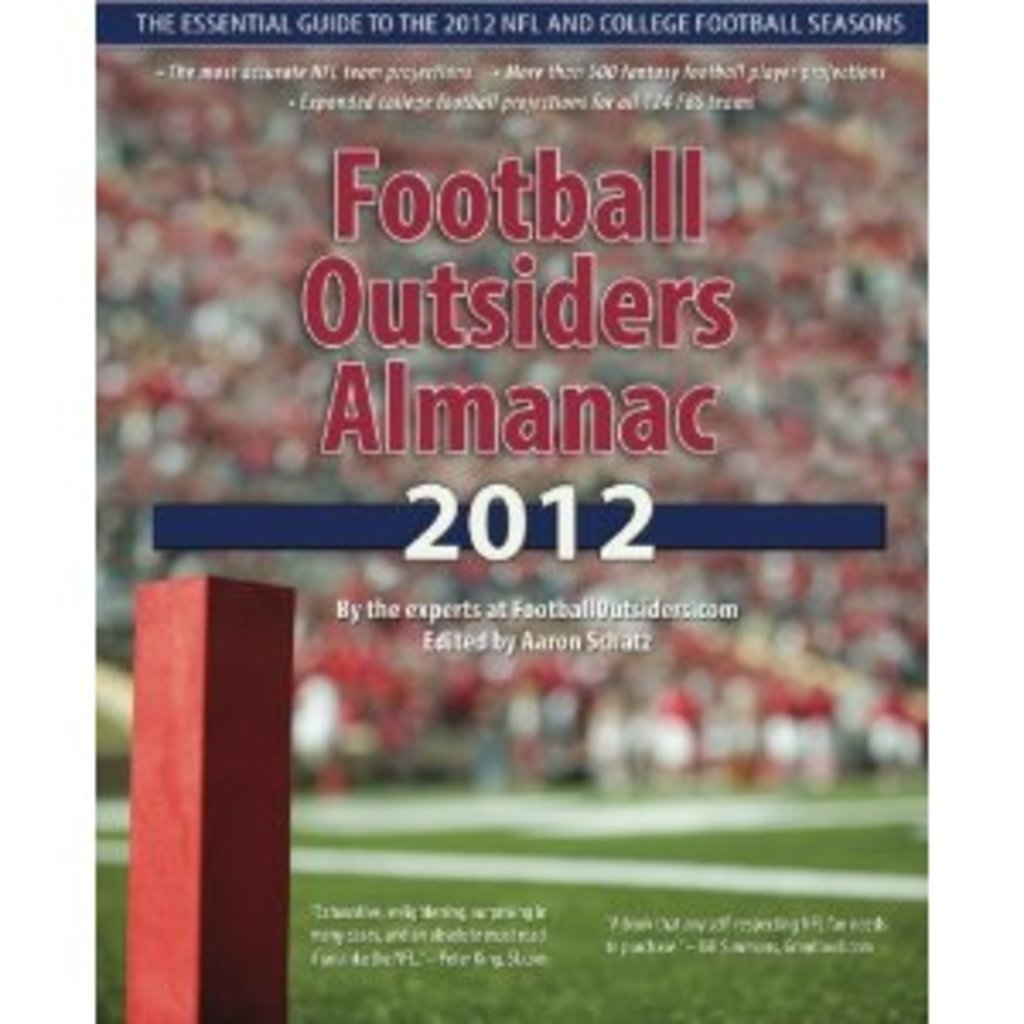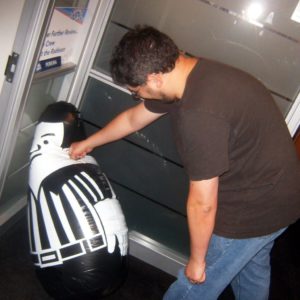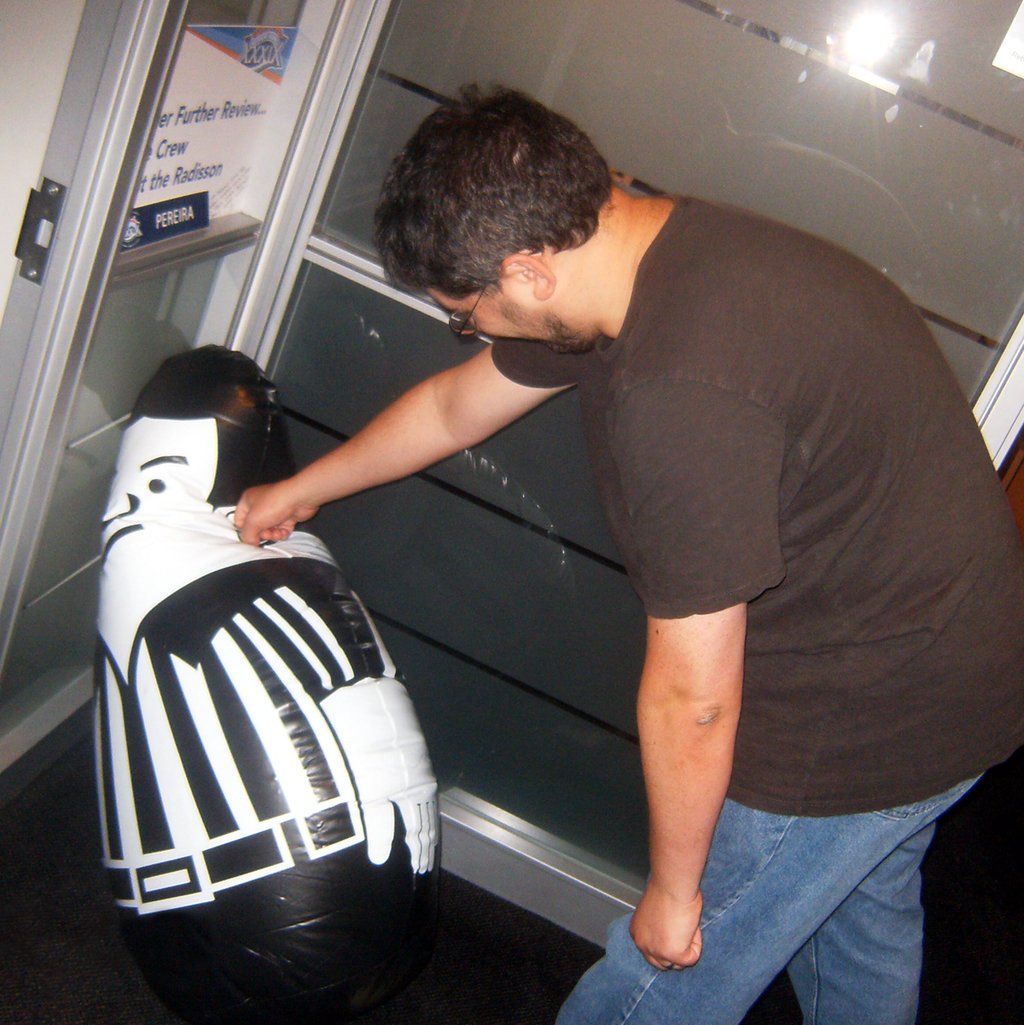In his book Blink: The Power of Thinking Without Thinking, Malcolm Gladwell wrote about a strange phenomenon. People tend to feel apprehension and uncertainty when they first encounter something wholly unfamiliar, something their past experience hasn’t prepared them for. People dislike that feeling, and quite often they mistake the dislike of the feeling of uncertainty for the dislike of the unfamiliar thing itself. It’s normal to resist the new and the different, at least at first. But when what’s new turns out to truly be better, it’s time to man-up and get with the program.
A story: halfway through the 2005 season, the Atlanta Falcons were 6-2 and in first place. They had the league’s top rushing offense, and were coming off a big Monday night victory over the Jets. Every major publication ranked them in the top five, at most ten, teams in the league. Except for Footballoutsiders.com, that is–FO, for short–where the Falcons were ranked a paltry 17th. Certain Atlanta fans got wind of this, and publicly urged their fellows to flood FO with comments deriding this perceived affront. They turned out in droves–frenzied Falcons fans, expressing their furor–accusing FO of being “Falcons h8ers” living in their parent’s basements, of having unwarranted malice toward Michael Vick, or simply of knowing nothing about football in general.
Most publications use power ranking “systems” based on writers’ subjective opinions, which in turn are usually based on win-loss records. Football Outsider’s rankings are the output from an objective mathematical formula¹, conceived and constructed by Aaron Schatz, that accounts for contextual factors, including relative strength of opposition, and what’s called “fumble luck.” Turnovers can be pivotal plays; a fumble recovery can turn a loss into a win, and vice-versa. Knocking the ball out of a ballcarrier’s hands is a skill. Holding on to the ball is also a skill. They can be improved with coaching and practice. But an egg-shaped football is uniquely wont to bounce in unpredictable directions. Recovering a fumble, as it ricochets erratically around the turf, is not a skill. FO’s research shows “the odds of recovery are based solely on the type of play involved [run, pass, sack, etc], not the teams or any of their players.”

The 2005 Falcons had recovered 15 of 19 fumbles in their first eight games. But in their last eight, they recovered only 5 of 18. Even though they didn’t otherwise play significantly better or worse, they went 2-6 in those games. Reversed fumble luck, plus a tougher schedule, meant a third place finish and an 8-8 final record. The formerly effusive Falcons fans grew taciturn, and the predictive capability of FO’s statistical analysis was vividly demonstrated.
This week I spoke with Aaron Schatz, editor-in-chief of Football Outsiders and lead writer, editor, and statistician on the annual Football Outsiders Almanac. His writing can be found in a number of publications, including The New Republic, The New York Times, The Boston Globe, and Slate.com.
The New York Times Magazine called him the “Bill James of football.” Bill Simmons described him as a “statistical rock star.” But, as he told deadspin’s Will Leitch in 2009, he just wants to make NFL fans “feel like they are more knowledgeable and more entertained.” We talked about the evolution of his stats, NFL teams that may be reading his work, being a Pats fan, and the awful pizza in New England’s press box.
Thank you for taking time out of the middle of football season to talk with me. So how did you become a New England Patriots fan? What are your earliest memories watching the team
I started out as a Rams fan, since I lived in Orange County, California until I was 13. Eric Dickerson was my favorite player as a kid. I moved to the Boston suburbs in 1987, though, and I gradually lost interest in the Rams. First I left them, then they left L.A. Boston really wasn’t a football town though, not at all. Remember, the team almost moved to St. Louis in the early 90’s. It’s really hard to overstate what it meant when the Patriots hired Bill Parcells in 1993 and drafted Drew Bledsoe. That’s the beginning of the modern Patriots right there, the beginning of the huge current Patriots fanbase. So I remember watching some games in high school in 1990-1991, in the horrible Rod Rust/Dick McPherson era, but I really didn’t care much about the Pats until the Parcells years. Then especially when I went to Daytona Beach to work in radio in 1996, I used to go to a sports bar every week to watch the Pats; it’s how I kept connected with home.
What was it about the “run to win” myth² that motivated you to write The Establishment Clause, establish Football Outsiders, and help many of us to appreciate football on new levels? Why not be content to just complain to your friends/yell at the T.V. that “establishing the run” is fictitious, or that rankings based on raw yardage totals suck³, like the rest of us?

The honest truth is that there were two guys who were contracted by the Baseball Prospectus folks to write a Pro Football Prospectus book starting in 2002. I was really excited about this, because I grew up as a huge Bill James fan and I also read Rob Neyer and BP and all the sabermetrics people that were around back 10 years ago. And I’m sorry for being blunt about this, but that Pro Football Prospectus book sucked. It was horrible. The writing was awful, and the stats weren’t really ground-breaking in any way. The authors kept talking about how they had a database of play-by-play, but they didn’t actually use it for anything. I read through the whole thing thinking “man, I could totally do better than this.” I just needed something to write about to get myself started, and the “establish the run” myth became my launch point because like many New England fans I was completely frustrated with Ron Borges of the Boston Globe and his bitter hatred for Bill Belichick and Tom Brady. The whole New England press corps split into dueling Brady and Bledsoe camps in 2001 and Borges was the worst of the Bledsoe people. So he was so happy when the Patriots missed the playoffs in 2002, and he wrote that it was because they couldn’t establish the run. And yet, this same guy Ron Borges was picking the Raiders to win the Super Bowl, and the Raiders ran less than any other team in the league. Since I had struck up a friendship with Bruce Allen, who ran the site Boston Sports Media Watch, I knew that I could try to do some research and write something up and somebody would run it. I had also written a couple of sports pieces for the Boston Phoenix, so that was a possibility too. So I started.
I never thought this would become a full-time job when I started, believe me. There wasn’t really a eureka moment, though. Basically, all the numbers I was playing with made sense, so we went forward and started a website. I think my goal was to do a better job than those original PFP guys but I never thought it would actually become a full-time job. And it’s not like we were super accurate in the first year, either; that was 2003, and the Panthers became the first of a number of teams to make our numbers look silly by going on a surprising postseason run after a mediocre regular season. And then after that, I didn’t have a chance to have a moment that convinced me that what I was doing was right, because in February 2004 it became the only thing I was doing. My eureka moment was when I was able to go off unemployment because I was making a living with FO!
 I blew it in 2007 in one of the expert leagues I was in. Mike Tanier and I were drafting together and we had a choice come down to Tom Brady or Donovan McNabb. Remember, at that point McNabb would still get 200 rushing yards and a couple rushing TDs every year, so his value wasn’t much lower than Brady’s. And we decided that we didn’t want to have to listen to people complain about how Football Outsiders is biased in favor of the Patriots, so we took a running back, I don’t remember who, and then grabbed McNabb in the next round. Whoops.
I blew it in 2007 in one of the expert leagues I was in. Mike Tanier and I were drafting together and we had a choice come down to Tom Brady or Donovan McNabb. Remember, at that point McNabb would still get 200 rushing yards and a couple rushing TDs every year, so his value wasn’t much lower than Brady’s. And we decided that we didn’t want to have to listen to people complain about how Football Outsiders is biased in favor of the Patriots, so we took a running back, I don’t remember who, and then grabbed McNabb in the next round. Whoops.
I have a strange history of doing better in experts leagues than I do in my own league with my friends from college, where we’ve been doing auction every year since before FO existed. This year is a bit opposite, though. My friend Ian thought I had the worst team out of 14 in that league because I went big on wide receivers and waited until late to grab running backs or a quarterback, and instead I’m currently 5-1. Also, we do this thing called “Multileague” where we draft teams in three different sports and you combine all the points to determine the winner, and I finished second last year in my first year of doing it: first in football, third in basketball, and fourth in baseball. I was an “expansion team” as they went from eight guys to ten, and I grabbed Aaron Rodgers off another team’s keeper roster to start my team. Good timing on that one. I also drafted Rob Gronkowski late in the draft. That league is insane — we have one draft in August where you get to pick players from all three sports (in baseball, you are picking for the season that starts THE FOLLOWING APRIL) and then three separate drafts to finish off your roster for each sport. I traded Joey Votto for Kevin Love last year. Good times.
The “FO Basics¹” page introduces some surprising and often counterintuitive concepts. Have those ideas changed the way you watch football? In other words, does an analytical understanding of football interfere with, or enhance, the emotional enjoyment of cheering your team on?

They’ve changed the way I look at team strategy, sure. They’ve changed the way I look at fourth downs, at run/pass ratio, things like that. And I have a better knowledge of which players are particularly good or bad. However, I’ll say that it is really tough to watch football analytically when you watch it live. The game goes by so fast, and the camera angles are so concentrated on the quarterback, and your eye naturally goes to the ball and not, say, the line blocking. So I generally watch Patriots games like a fan, complete with screaming at the TV (except when I’m at Gillette — no cheering in the press box) and then wait until the next day to re-watch some things and put the analyst hat on.
You should have seen me in the final five minutes of the Seattle game. I was despondent. I didn’t think it could get any worse. Then I found out the next night it can get worse — if your favorite team happens to employ Norv Turner and Philip Rivers. Mine doesn’t.
What celebrities, NFL coaches, or professional players do you know of that follow FO, or publicly support FO’s methods?⁴
For the most part, I don’t think I’m allowed to talk about which NFL teams I’ve worked with, but I’ve worked with a few. Jim Schwartz of the Lions has been very open about his appreciation for my work. As far as front offices, I can probably be open about the Jaguars, because Tony Khan (son of the new owner) was very open about his love for Football Outsiders on his Twitter feed before his father bought the team, and he’s heading up a new analytics department in their front office. There are some interesting famous comedians and actors following FO’s Twitter feeds, and we used to run a testimonial from Keith Olbermann about how he won his fantasy league using our KUBIAK projections. I honestly don’t know much about current players and whether they read FO at all; there are definitely some former players. It was cool one day when I was looking through sales on FOA and one of the names in our Paypal account was Adam Archuleta. And I’m guessing guys like Andrew Luck and Evan Moore know about us because one of their old teammates, Ben Muth, now writes for us as our offensive line analyst.

What is your favorite place to watch football on a Sunday? If you’re at a sports bar with a TV for every game, how many can you follow at once?
My favorite setup for football on Sunday is when the Patriots are playing a 4pm home game, because I can hang out and watch the 1pm games with the rest of the press and get their takes on what’s going on around the league. Usually a 4pm game is a big one, so there will be some good national guys there for me to talk with; Week 5, for example, I ended up sitting with Sal Palantonio and Albert Breer for the last hour or so of those games, and those guys are far more plugged in to what’s going on in front offices and locker rooms than I am, so I learn from them. Then you get to see a game live at 4pm from the comfort of the press box. Then I sit and break down stats for an hour, hour and a half, and head home in time to start watching Sunday night’s game around the second quarter. The only thing bad about it is that the pizza they serve the writers at Gillette after games is horrible, the worst, nastiest pizza I’ve ever had in my life. I grew up in the town next door and I could tell them 20 better pizza places to order from that would make for much happier writers.
In a previous Taking a Knee, Star Wars author Drew Karpyshyn said that Bill Belichick is the NFLer most likely to follow the teachings of the Sith, if he lived in the Star Wars universe and had the Force. Would you agree?
Just to be clear, is he suggesting that Bill Belichick is most likely to draw his power from emotion and passion fueled by rage? Emotion and passion? Bill Belichick? Does he strike you as a particularly emotional or passionate guy? No, you want someone with emotion and passion fueled by rage. Buddy Ryan would be the greatest Sith in NFL history.
Aaron Schatz is the editor-in-chief of footballoutsiders.com and the lead writer, editor, and statistician for the annual Football Outsiders Almanac. He also writes for ESPN.com and ESPN The Magazine. You can follow his twitter feed @FO_ASchatz. The 2012 Football Outsiders Almanac can be purchased in hard-copy or downloaded as a .pdf from http://www.footballoutsiders.com/store.
(ed. note–without contesting the validity of Aaron’s point about Buddy Ryan, it must be noted here that pictures from last week’s New England/Seattle game have surfaced in which Belichick totally looks exactly like a Sith!)
——————————————————————————————————————-
Footnotes:
¹-Schatz came up with a set of tenets–some of them unexpected–that correlate with winning or losing. From http://www.footballoutsiders.com/info/FO-basics: You run when you win, not win when you run. Teams with more offensive penalties generally lose more games, but there is no correlation between defensive penalties and losses. Recovery of a fumble, despite being the product of hard work, is almost entirely random. Injuries regress to the mean on the seasonal level, and teams that avoid injuries in a given season tend to win more games, which means a team built on depth is better than a team built on stars backed up by scrubs. Schatz built a regression analysis model including these principles, fed it official NFL play-by-play data, and after some tweaking, can sit back and watch as it spits out fascinating results.
²-The Establishment Clause (http://www.footballoutsiders.com/2003/07/14/ramblings/stat-analysis/3/) was the first article published at FO, correcting the confused correlation/causation in a statement hack sportswriters and announcers love repeating: “team X is 90-1 when running back Y gets 30 carries (or 100+ yards).” The running back got all those carries and yards because his team was winning and trying to run out the clock, the team wasn’t winning because they force-fed their back tons of carries early in the game. “You run when you win, not win when you run.”
³-The NFL uses raw yardage totals to rank players and teams. But that doesn’t answer the following question: “running back A runs for three yards. Running back B runs for three yards. Which run was better?” If A’s run came on a 3rd and 2, and B’s run came on a 3rd and 15, then A is obviously better. If A was playing against Kansas City, and B was playing against San Francisco, then B is probably better. It’s easier to gain yards against a bad defense; it sounds obvious, but the NFL rankings ignore this.
⁴-In 2010, then-President of the Indianapolis Colts Bill Polian criticized Schatz’s work at FO, saying “statistics are virtually meaningless in football… standalone statistics such as exist in baseball–sabermetrics, if you will–have no validity in the NFL.” However–and this is besides the fact that NFL head coaches Jim Schwartz and Sean Payton have been pretty successful using advanced FO-style statistical analysis–Schatz would be the first person to tell you that any numbers, however advanced, are only useful in the context of watching actual, old-fashioned game film. They are a tool that, applied correctly, can help to understand the game, but no one would pretend they’re an end in themselves.
 Pete is a Redskins fan living in Bronco country. He’s co-founder of the Team Tomorrow ski and snowboard team, and a guy at the bar last Sunday told him, “you know a lot about football for a weirdo.” He is also HEAD writer for the Warren Peace NFL Report. Follow Pete on twitter @TakingaKnee303
Pete is a Redskins fan living in Bronco country. He’s co-founder of the Team Tomorrow ski and snowboard team, and a guy at the bar last Sunday told him, “you know a lot about football for a weirdo.” He is also HEAD writer for the Warren Peace NFL Report. Follow Pete on twitter @TakingaKnee303





